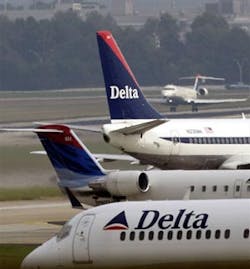Specter of Possible Bankruptcy Filing at Delta Raised Anew
ATLANTA (AP) -- Delta Air Lines Inc. dodged a bankruptcy filing last fall thanks to deep concessions from pilots and fresh financing from creditors.
But six months later, the nearly $1.1 billion in loans have been spent and high fuel prices have overshadowed cost-cutting successes. And that's put Delta again at risk of having to seek Chapter 11 bankruptcy protection, according to Calyon Securities airline analyst Ray Neidl.
Neidl estimated in a research note issued Tuesday that the nation's third-largest carrier is burning through $4 million in cash a day. Without an improvement, that could drop its unrestricted cash reserves to $1.47 billion by the end of June and $466 million by year's end, dangerous levels for a company with heavy debt and pension funding obligations.
''In our opinion, Delta appears to be the most likely candidate for a bankruptcy filing this year based on its liquidity position,'' said Neidl, who added in an interview that the crunch time will likely come this fall.
Delta spokeswoman Benet Wilson said she could not comment on the possibility of a Chapter 11 filing nor elaborate on the airline's earnings results issued last Thursday, when Delta said it lost nearly $1.1 billion in the first quarter, the highest in the industry for the January-March period.
''We really don't have anything to add on top of that,'' Wilson said in an e-mail response to a phone call.
Delta shares have lost more than 90 percent of their value in the last four years, reducing the market value of the company's stock to only about $500 million. By comparison, discount carrier Southwest Airlines Inc.'s market capitalization of $11.5 billion is 23 times larger.
Delta's shares fell 12 cents, or 3.3 percent, to $3.55 in trading Tuesday on the New York Stock Exchange.
Delta did not mention the bankruptcy issue in its earnings release or in a subsequent conference call with analysts, but chief executive Gerald Grinstein indicated March 23 at an investor conference in New York that Delta has not ruled out bankruptcy as an option.
Delta had $1.8 billion in unrestricted cash reserves at the end of the first quarter, the same level as at the end of the fourth-quarter of 2004.
But Delta also said that it borrowed during the quarter the remaining $250 million under a financing agreement with American Express. That was on top of another $830 million that it borrowed in the fourth quarter of last year from American Express and General Electric to fund its daily operations, repay debt and increase cash reserves.
Looking ahead, Delta has significant financial obligations this year, according to regulatory filings. These include $1.1 billion in operating lease payments, $1 billion in interest payments, $835 million in maturing debt that must be repaid and $450 million in pension funding requirements.
J.P. Morgan airline analyst Jamie Baker said in a research note after Thursday's earnings release that Delta needs at least $500 million in additional cash reserves to ''merely limp into 2006.''
William Rochelle, an airline bankruptcy lawyer in New York, said that because of high fuel prices, bankruptcy remains a possibility for several major carriers, including Delta.
''It's just a question of who goes first,'' Rochelle said. ''Industry conditions are nothing short of brutal.''
Aviation jet fuel costs have risen about 50 percent in the last year for U.S. carriers. Delta, alone, spent $884 million on aircraft fuel in the first quarter, up 54 percent from $574 million a year earlier.
Rochelle said a bankruptcy filing by Delta would be particularly difficult because the airline has pledged nearly all of its assets to cover earlier financing agreements.
''Filing would make bankruptcy for them a 'come as you are' party,'' he said.
Neidl said in his research note that Delta still has some marketable assets that it could sell to raise cash to keep itself afloat, including feeder carriers Comair and Atlantic Southeast Airlines. He estimated a sale of Comair and ASA could fetch for Delta $600 million to $800 million. Delta has indicated it is considering selling non-core assets, but has not specifically said that it plans to shed the two feeder carriers.
